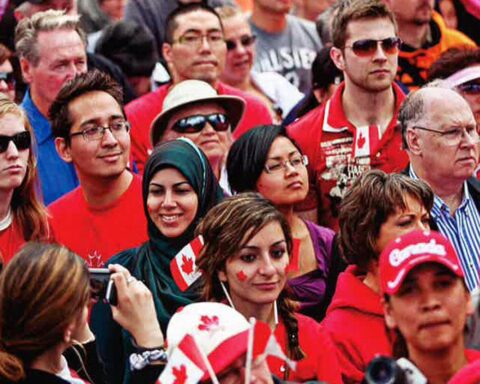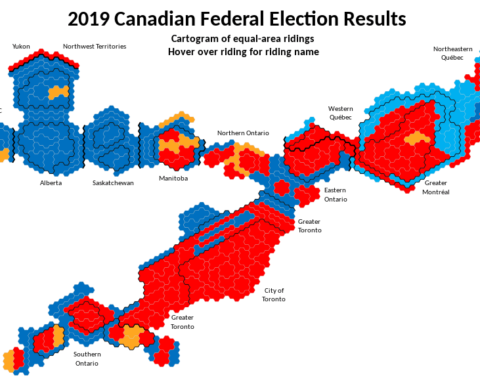Not only is this one of the longest campaigns in Canadian political history, it may turn out to also be one of the most historically significant.
In recent public opinion polls, only two per cent of respondents said they think this election is less important than previous elections; 75 per cent think it is more important. Voters tell us they are unusually emotionally engaged and that they see this election having huge stakes. The vast majority of Canadians think both the country and their lives will not be the same after this election.
All in all, we have tracked a very dramatic lean among the Canadian public, who see this election as a historically significant choice for the country – and which may well be reflected in the significant turnout to the advance polls.
The vast majority of Canadians think both the country and their lives will not be the same after this election.
All about the niqab
So why is this election so important? We need look no further than to the realm of values to see why it has assumed such momentous stakes. For an election that started out as all ‘about the economy stupid’ it has become ‘all about the niqab.’
But the debate about the niqab may be transforming into a broader debate about values, about the kind of Canada its citizens want, and what kind of country do we want to hand off to the next generations? How do we want to be seen by the external world? What constitutes our basic sense of right and wrong, good and bad?
Older, less educated and dare we say ‘old stock’ Canada have very different value preferences than younger and university-educated Canada.
It is not surprising that these kinds of fundamental normative questions result in an emotionally charged electorate and especially so against the backdrop of ‘two Canadas’ that are increasingly divergent at the level of basic values. The critical fault lines are both generational and class driven.
Older, less educated and dare we say ‘old stock’ Canada have very different value preferences than younger and university-educated Canada.
Many would consider the shift to a focus on culture, race, and identity to be a terrible distraction from what the Canadian public continues to identify as much more critical issues; the economy, the health-care system and negotiating a path to a post carbon economy.
Some would also decry the focus on the niqab and related culture war issues as an expression of reckless political adventurism, blind to the corrosive impact this may have on societal well-being in the future.
While these may well be compelling critiques, the initial debate appears to have triggered a much broader and important contest for the future based on fundamental values choice. This is undoubtedly why our respondents are signalling that they see this as such a historically important election which is so engaging.
Who will win the values struggle?
We would argue that the focus on these issues, which emerged following the media focus on the Syrian refugee crisis — elevated the Conservative Party from a party losing a race on the economy and corruption, to a party squarely in contention to win.
What may not have been as obvious – or even intended – is that that this debate about values has not only increased engagement amid the Conservative base, it may also have galvanized the dithering progressive majority.
Trying to assess who will win this values struggle is highly uncertain and why we can offer no clear answer yet as to who will win the next election.
The critical question is whether the growing engagement of the centre-left constituencies will translate into actual voter behaviour (turnout and choice).
The level of engagement of the Conservative constituency really isn’t in doubt. The critical question is whether the growing engagement of the centre-left constituencies will translate into actual voter behaviour (turnout and choice).
At this stage, we can only hazard a guess that this heightened level of engagement will be reflected in voter behaviour; but at this stage, it simply is not clear.
We do note that Stephen Harper’s surprising victory in 2011 was rooted in his huge success with the elderly and less-educated cohorts.
It is important to note that there are even more seniors this time out and contrary to some claims that the Liberals and Conservatives are equally matched with this cohort, that appears simply wrong. The Conservatives have a huge and stable lead with seniors at this time.
While we cannot clearly see the outcome of this protracted and increasingly acrimonious campaign, we do see some of the forces shaping it to date and the key issues to watch in the coming days.
We are guessing by mid-week, the post-turkey discussions will have coalesced to provide greater clarity. There will likely be far more talk about cultural issues than about the economy, something that was frankly unforeseeable a month ago.
The big “what-kind-of-Canada-do-I-want” questions
Apart from the shift to a debate about identity and culture, what other forces are clear at this stage?
The Liberals have definitely made significant progress and now are the clear alternative for the forces of electoral change. The NDP have been in decline and if they don’t show signs of life by midweek they will see their fortunes greatly diminished in the coming parliament.
Ironically, they may well have considerably greater power than they did in the last parliament where they had the second-most seats, but almost no real power against the Harper majority.
We also note that the possibility of another Harper majority is greeted with near apoplexy in our internal polling of the two-thirds of the electorate that are seeking change.
The election outcome will almost certainly hinge on whose supporters are most engaged around the values issues — the big “what-kind-of-Canada-do-I-want” questions.
This time around, that cell-phone-only population is at least three times larger and tells us they are much more certain to vote than they told us last time.
The higher the levels of overall engagement, the higher the turnout and the poorer Mr. Harper’s prospects. Of great interest is the huge advance turnout which we have been tracking in our polling as well.
Interestingly both the Conservatives and Liberals are running neck and neck there and the NDP isn’t doing very well.
Finally, it is worth noting the role of the cell-phone-only population — younger and better educated — in the coming days.
Quite simply, this segment will be critical to the outcome of the election.
In the last election, Ekos polls overestimated this segment’s willingness to vote. This time around, that cell-phone-only population is at least three times larger and tells us they are much more certain to vote than they told us last time.
When polled, they insist they are extremely engaged and motivated by the values war that has come to underlie this election.
What that means: if they show up Harper loses; if they don’t he wins.
Frank Graves is the president and founder of EKOS Research Associates. He is a frequent commentator in Canadian media.
Published in partnership with iPolitics.ca.




